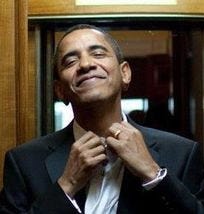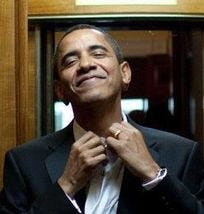
Last night, President Obama delivered his final State of the Union address. In it, he expressed personal discontent with the years of national polarization that have accompanied his tenure in office. He admitted that the situation is worse now than how he'd found it back 2008.
"It’s one of the few regrets of my presidency – that the rancor and suspicion between the parties has gotten worse instead of better,” the president said from the United States Capitol. "There’s no doubt a president with the gifts of Lincoln or Roosevelt might have better bridged the divide, and I guarantee I’ll keep trying to be better so long as I hold this office.”
It was a good line, but the reality is that Obama already has the gifts required to soften the increasingly sharp tone that has plagued our ideologically diverse nation over the years (he's far better equipped than most, in fact). He has simply chosen not to use those gifts.
The truth is that that promising young politician, who began his rise to prominence in 2004 with a high-profile, universally praised speech about national unity, never really believed his own rhetoric.
We caught a few glimpses of Obama's true regards for Americans on the other side of the ideological spectrum (specifically those who embrace traditional values) in 2008, as he was campaigning for the presidency. It was in April of that year that he was recorded behind closed doors famously describing them as bitter, bigoted people who "cling to guns or religion."
Still, Hope and Change won the day, Obama was elected our 44th president, and all of those promises of national unity soon flew out the window. The administration never got around to searching for common ground from which to solve the problems our country faced. It instead spent the next four years incessantly blaming George W. Bush for all of the country's continuing woes, while shoving a deeply unpopular, massive healthcare bill right down Americans' throats.
This, of course, led to the rise of the Tea Party, a national grassroots protest against gross government reach. Recognizing it as a political threat (especially after the 2010 elections), the mainstream media and Democratic Party portrayed the Tea Party instead as a racist movement against our president.
With an awful economy, chronically high unemployment, and essentially no presidential achievements to boast of by the time the 2012 campaign rolled around, Obama's re-election strategy was built almost entirely around pitting different demographics of Americans against each other.
Disciplinary class warfare rhetoric was used to create scapegoats and stoke jealousy among the electorate. Wealthy people were portrayed as villains who weren't paying their "fair share," and the middle class was told they were victims of wealthy people.
The War on Women was unveiled to fabricate the threat of some cultural return to a Mad Men era of white male chauvinism. This of course included possible birth control bans, unequal pay for women, and insensitivity to rape.
Racial tensions were fueled by Obama inserting himself into local police matters like the Trayvon Martin case. And of course there were all of those mouthpieces and supporters in the media who manged to identify "racial code words" whenever a prominent Republican criticized the president.
Obama's general election opponent Mitt Romney perhaps summed things up best (a couple of months out from the election) when he said: "His [Obama's] campaign strategy is to smash America apart and then try to cobble together 51 percent of the pieces. If an American president wins that way, we would all lose..."
He was right, of course. Obama may have won that year, but the country lost all hope of attaining precisely what the president says he wanted.
Of course, Obama didn't do this all on his own. There's been plenty of "rancor" (as the president put it) from both sides of the aisle, and it certainly existed long before he took office. What's silly is the notion that the president tried to improve the situation. He most certainly did not. He enthusiastically added to it.
What could he have done differently, had he been serious about uniting the country? It's a question (a fair one) that is often asked when our president is categorized by someone as a divider. Beyond the obvious answer of making a serious attempt to work with the opposition party in congress, there's another, much simpler idea that presented itself just last week.
It was something called "Guns in America" – a nationally-televised CNN town hall event, hosted by Anderson Cooper. The event was billed as an opportunity for citizens from both sides of the U.S. gun control debate to engage in dialogue directly with President Obama.
I must admit that when I first heard of the event, I assumed it would be of a similar style to other "town halls" our president has participated in. In the past, they've typically consisted of a room full of Obama supporters asking propagandist, tightly-scripted softball questions, while the opposing viewpoints are delegitimized down to a caricature (another example Obama's divisiveness).
With the CNN event, however, I was pleasantly surprised. The network actually managed to put together a solid group of thoughtful, particularly relevant participants, who were each given the opportunity to ask the President of the United States smart, serious questions about gun control. It was a real dialogue – largely respectful on both sides – with Anderson Cooper doing a fair job of moderating.
What made the forum particularly valuable was that it put Obama on even footing with people whose arguments he typically twists into straw-man postures for the sake of bolstering his own agenda. By forgoing that advantage this time, and placing himself in a position where he would be forced to deal directly with contending viewpoints, he made the kind of concession he rarely makes to the American public.
In exchanging ideas with staunch Second Amendment advocates like Taya Kyle (Chris Kyle's widow) and rape survivor Kimberly Corban (full disclosure: Corban is a friend of mine), Obama gave some power back to the people, and some credence to the views of his opponents. For that he deserves some credit...and even some respect. Imagine if President Obama had agreed to participate in these types of events years ago, on big, important issues like healthcare reform. Imagine how much political goodwill he could have earned by elevating his opposition rather than demonizing it.
It's not like the idea hadn't occurred to him. As some might recall, Obama actually proposed something similar when he was running for president in 2008.
"I'm going to have all the negotiations around a big table," said Obama on healthcare reform. "We'll have doctors and nurses and hospital administrators. Insurance companies, drug companies -- they'll get a seat at the table, they just won't be able to buy every chair. But what we will do is, we'll have the negotiations televised on C-SPAN, so that people can see who is making arguments on behalf of their constituents, and who are making arguments on behalf of the drug companies or the insurance companies. And so, that approach, I think is what is going to allow people to stay involved in this process."
People liked the C-SPAN idea at the time (even Obama's presidential opponent John McCain), as it was cast under the banner of inclusiveness and transparency.
Of course, it never happened. Obama never pursued it, because inclusiveness and transparency have never been part of the president's agenda. Divide and conquer has always been his game.
What a shame it's been for the country.











